On Demand Insurance Market Insights 2025, Analysis and Forecast to 2030, by Manufacturers, Regions, Technology, Application, Product Type
- Single User License (1 Users) $ 3,500
- Team License (2~5 Users) $ 4,500
- Corporate License (>5 Users) $ 5,500
On Demand Insurance represents a paradigm shift in risk coverage, offering flexible, micro-duration policies activated via mobile apps or APIs on an as-needed basis—hours, days, or trips—tailored to specific events like ride-sharing drives, equipment rentals, or event attendance, rather than annual commitments. These digital-first products leverage usage-based telematics, geofencing, and AI-driven risk scoring to price premiums in real-time (e.g., $0.50 per mile for car sharing), providing instant quotes, binding, and claims processing within minutes while integrating with platforms like Uber or Airbnb for seamless embedding. Unlike traditional term policies with fixed deductibles and exclusions, on demand insurance employs granular data—location, behavior, weather—to customize coverage limits and exclusions, achieving 40–60% cost savings for low-risk users and 95%+ digital claim payouts. Powered by blockchain for immutable policy ledgers, generative AI for personalized endorsements, and edge computing for offline activation, modern solutions scale to millions of micro-policies daily with sub-second underwriting. The global On Demand Insurance market is expected to reach between USD 1.0 billion and USD 2.0 billion by 2025. Despite being an innovative niche within the $6 trillion+ insurance industry, on demand insurance serves an indispensable role as the enabler of gig economy protections. Between 2025 and 2030, the market is projected to grow at a compound annual growth rate (CAGR) of approximately 10.0% to 20.0%, driven by the gig workforce expansion, embedded finance proliferation, and regulatory sandboxes for insurtech. This dynamic growth underscores the model's transformative potential in democratizing access to tailored protection, even as it navigates data privacy complexities and actuarial innovations.
Industry Characteristics
On Demand Insurance belongs to the family of usage-based insurtech solutions, which are typically activated as event-triggered modules in conjunction with telematics devices and partner ecosystems to forge episodic risk ecosystems. While annual auto policies provide blanket coverage, on demand models decompose exposure into granular intervals through API-triggered binding and telematics streaming. This synergistic mechanism allows for enhanced protection against underinsurance gaps, particularly during intermittent risks like seasonal rentals or freelance gigs.
The industry is characterized by high specialization, with development concentrated among a limited number of digital insurers and embedded partners. These innovators are often integrated within the broader insurtech market, supplying various micro-policies for mobility, property, and liability. Compared with traditional term insurance or captives, the on demand market is smaller, but its critical role in extending coverage to the underinsured ensures consistent demand.
On Demand Insurance is particularly valued in car sharing coverage. Ride-hailing drivers, which account for the largest share of episodic risks, are prone to gap exposures during off-duty periods, and the incorporation of on demand policies significantly enhances affordability, particularly under variable utilization. Rising demand for car insurance in gig platforms ensures continued reliance on on demand models as part of protection systems.
Regional Market Trends
The consumption of On Demand Insurance is distributed across all major regions, with demand closely linked to gig economy participation and digital payment penetration.
● North America: The North American market is estimated to hold a moderate share of global On Demand Insurance consumption. Growth in this region is projected in the range of 10.0%–17.0% through 2030. The demand is supported by mature but steady ride-hailing operations in the United States, especially for Uber and Lyft drivers. Gig workers, which rely on on demand policies for trip coverage, also contribute to steady demand. Regulatory pressures regarding worker classification have prompted local platforms to optimize insurance integrations, which continues to sustain usage as part of standard protection protocols.
● Europe: Europe represents another important market, with estimated growth in the 9.5%–16.5% range over the forecast period. The European insurtech sector is advanced, with strict regulatory frameworks regarding data privacy. Demand for On Demand Insurance is supported by the mobility, e-commerce, and freelance sectors. However, environmental regulations and a strong push toward sustainable mobility pose both challenges and opportunities for policy producers. The incorporation of on demand coverage in EU gig worker directives is becoming increasingly important, which is likely to sustain demand in this region.
● Asia-Pacific (APAC): APAC is the dominant region for On Demand Insurance consumption, expected to grow at 11.0%–20.0% CAGR through 2030. India, China, Indonesia, and Singapore drive the majority of demand due to their large-scale ride-hailing, delivery platforms, and digital wallet ecosystems. In particular, India accounts for the largest share, supported by its massive two-wheeler fleets and UPI integration. China is experiencing rapid growth in short-term property coverage for rentals, further boosting consumption. APAC’s leadership is also supported by the presence of several key digital insurers and cost-competitive API platforms.
● Latin America: The Latin American market remains relatively small but is projected to grow in the range of 10.0%–17.0%. Brazil and Mexico are the primary countries driving demand, supported by expanding delivery and freelance markets. Economic volatility in some Latin American countries may limit broader market expansion, but steady demand for micro-coverage ensures a consistent role for On Demand Insurance in gig systems.
● Middle East and Africa (MEA): MEA is an emerging market, with estimated growth in the 10.5%–18.0% range. The region benefits from investments in digital finance and mobility, particularly in the Gulf countries. As regional gig platforms grow, consumption of on demand policies for event-based risks is expected to increase correspondingly.
Application Analysis
On Demand Insurance applications are concentrated in Individuals and Businesses, with coverage types including Car Insurance, Home Appliances Insurance, Entertainment Insurance, Contractor Insurance, Electronic Equipment Insurance, and Others, each demonstrating unique growth dynamics and functional roles.
● Individuals: This is the largest application segment, accounting for the majority of On Demand Insurance consumption. Growth in this application is estimated in the range of 10.5%–19.0% CAGR through 2030. Individuals engaging in gig work are prone to episodic exposures, and the incorporation of on demand policies significantly enhances accessibility, particularly under variable schedules. Rising demand for individuals in ride-hailing ensures continued reliance on insurance as part of protection systems.
● Businesses: Growth in this segment is projected in the 10.0%–18.0% range, supported by contractor and event coverage. Businesses rely on policies to cover short-term assets. Trends include API-embedded endorsements and fleet micro-policies.
Company Landscape
The On Demand Insurance market is served by a mix of global insurers and insurtech disruptors, many of which operate across the broader digital protection ecosystem.
● Allianz SE: A German insurance behemoth, Allianz offers Allianz On Demand for travel and event coverage, supplying global consumers with a focus on seamless app activation.
● AXA SA: AXA's XL for short-term liability serves businesses, strong in European freelance markets.
● Lemonade Inc.: Lemonade's pay-per-hour renters policy pioneers U.S. micro-insurance, dominant in millennials.
● Metromile Inc. (Halo Group): Metromile's per-mile auto leads in gig driver coverage.
● Root Insurance: Root's telematics-based trip insurance excels in U.S. urban mobility.
Industry Value Chain Analysis
The value chain of On Demand Insurance spans risk assessment to claim resolution. Upstream, telematics providers stream data via APIs, with underwriters applying ML for pricing. Platforms like Lemonade bind policies in seconds, integrating with partners (Uber, Airbnb). Consumers activate via apps, with IoT confirming usage. Downstream, claims auto-process via photo verification, with payouts in hours. The chain highlights On Demand Insurance as a specialty activator, enhancing episodic protection with real-time granularity.
Opportunities and Challenges
The On Demand Insurance market presents several opportunities:
● Gig economy expansion: Global freelance growth directly drives policy demand, particularly for individuals and businesses.
● Embedded finance: As platforms integrate, on demand offers a significant growth avenue for seamless coverage.
● Emerging markets: Rapid digital payment adoption in Asia-Pacific and Latin America creates new opportunities for micro-products.
However, the industry also faces challenges:
● Environmental regulations: Stricter EU data rules may pressure providers to innovate privacy-first telematics.
● Market concentration: With a limited number of digital insurers, the market faces risks related to supply stability and pricing wars.
● Competition from captives: Self-insurance by platforms may reduce reliance on third-party on demand, requiring providers to adapt to evolving preferences.<|control12|>### On Demand Insurance Market Summary
On Demand Insurance, also known as pay-per-use or micro-insurance, delivers flexible, event-triggered coverage policies that activate for specific durations—such as hours, days, or trips—via mobile apps or APIs, providing tailored protection for assets like vehicles during rideshares, gadgets during travel, or liability during freelance gigs without long-term commitments. These digital products harness real-time data from telematics, geolocation, and behavioral signals to dynamically adjust premiums (e.g., $0.25 per minute for drone operation or $5 per event for concert cancellation), enabling instant quoting, binding, and cancellation with 90%+ automation. Unlike conventional annual policies burdened by fixed premiums and broad exclusions, on demand insurance granularizes risk into bespoke modules, integrating with ecosystems like Uber or Airbnb for seamless embedding and claims resolution in under 24 hours. Powered by AI-driven underwriting, blockchain for policy portability, and edge computing for offline validation, modern solutions scale to billions of micro-transactions annually while achieving 40–60% cost reductions for intermittent users. The global On Demand Insurance market is expected to reach between USD 1.0 billion and USD 2.0 billion by 2025. Despite being an agile niche within the $6.5 trillion insurance behemoth, on demand insurance serves an indispensable role as the safety net for the gig and sharing economies. Between 2025 and 2030, the market is projected to grow at a compound annual growth rate (CAGR) of approximately 10.0% to 20.0%, propelled by the gig workforce surpassing 1 billion globally, embedded finance proliferation, and regulatory sandboxes fostering insurtech innovation. This vigorous expansion highlights the model's disruptive potential in making protection as fluid as modern life, even as it confronts actuarial precision and data governance hurdles.
Industry Characteristics
On Demand Insurance belongs to the family of usage-based insurtech offerings, which are typically invoked as modular add-ons in tandem with telematics hardware and partner APIs to architect ephemeral risk architectures. Whereas perpetual auto policies furnish blanket safeguards, on demand variants dismantle exposure into atomic episodes through API-orchestrated activation and telematics corroboration. This collaborative dynamic yields amplified fortification against interstitial voids, eminently amid sporadic perils like transitory rentals or pop-up events.
The industry manifests acute specialization, with origination coalesced among a discrete cadre of digital insurers and embedded consortia. These trailblazers frequently interlace within the vast insurtech continuum, provisioning sundry micro-policies for locomotion, chattel, and encumbrance. Relative to entrenched term insurance or mutuals, the on demand niche is more nimble, yet its paramount function in elongating safeguards for the undersecured guarantees perennial solicitation.
On Demand Insurance garners especial acclaim in car insurance for gig drivers. Ride-hailing operatives, constituting the preponderant quota of episodic locomotion hazards, are liable to interstitial exposures amid idle intervals, and the infusion of on demand variants markedly bolsters affordability, preeminently beneath capricious itineraries. Ascendant mandates for car insurance in platform economies vouchsafe perpetual dependence on on demand archetypes within safeguarding scaffolds.
Regional Market Trends
The assimilation of On Demand Insurance traverses principal territories, with solicitation inextricably entwined to gig participation and numeral disbursement permeation.
● North America: The North American domain is posited to seize a tempered moiety of worldwide On Demand Insurance assimilation. Augmentation herein is prognosticated betwixt 10.0%–17.0% through 2030. Solicitation is buttressed by consummated yet persevering ride-hailing bastions in the United States, eminently for Uber and Lyft operatives. Gig laborers, contingent on on demand variants for excursion safeguards, likewise foster dependable solicitation. Oversight on labor stratification and cyber guardianship has impelled domestic scaffolds to hone insurance confluences, perpetuating deployment as intrinsic to quotidian safeguarding canons.
● Europe: Europe constitutes a salient theatre, with anticipated progression of 9.5%–16.5% across the vista. The continental insurtech apparatus is erudite, underpinned by austere edicts on data guardianship. On Demand Insurance requisites are fortified by the locomotion, e-commerce, and freelance realms. Nonetheless, ecological mandates and zealous advocacy for equitable paradigms tender dual-edged vicissitudes for policy artisans. Infusing on demand variants in EU gig operative precepts is ascending in salience, inclined to perpetuate continental solicitation.
● Asia-Pacific (APAC): APAC wields hegemony in On Demand Insurance assimilation, slated for 11.0%–20.0% CAGR to 2030. India, China, Indonesia, and Singapore propel the preponderance, galvanized by expansive ride-hailing, conveyance scaffolds, and numeral purse ecosystems. India, conspicuously, commandeers primacy, buoyed by colossal two-wheeler legions and UPI confluence. China beholds precipitate ascent in ephemeral chattel safeguards for rentals, amplifying assimilation. APAC's suzerainty further derives from manifold pivotal numeral insurers and economical API locales.
● Latin America: The Latin American domain lingers modestly dimensioned yet contemplates 10.0%–17.0% exaltation. Brazil and Mexico vanguard, abetted by burgeoning conveyance and freelance markets. Fiscal caprice in discrete Latin American fiefdoms may constrict panoramic proliferation, yet unwavering micro-safeguard requisites affirm a steadfast niche for On Demand Insurance in gig apparatuses.
● Middle East and Africa (MEA): MEA burgeons as a nascent fiefdom, eyeing 10.5%–18.0% escalation. The expanse avails from numeral finance infusions and locomotion diversification, eminently in Gulf bastions. As continental gig scaffolds burgeon, assimilation of on demand variants for event-based perils anticipates magnification.
Application Analysis
On Demand Insurance utilizations coalesce in Individuals and Businesses, with coverage archetypes encompassing Car Insurance, Home Appliances Insurance, Entertainment Insurance, Contractor Insurance, Electronic Equipment Insurance, and Others, each evincing discrete ascension kinetics and vocational enclaves.
● Individuals: This paramount utilization cluster commandeers preponderant On Demand Insurance assimilation. Trajectory herein is gauged at 10.5%–19.0% CAGR to 2030. Individuals immersed in gig toil are susceptible to episodic exposures, and variant infusion markedly fortifies accessibility, eminently beneath capricious timetables. Ascendant imperatives for individuals in ride-hailing vouchsafe sustained adherence to insurance within safeguarding scaffolds.
● Businesses: Augmentation herein is charted at 10.0%–18.0%, buoyed by contractor and event encumbrances. Businesses hinge on variants to mantle transitory chattels. Evolutions encompass API-amalgamated endorsements and fleet micro-policies.
Company Landscape
The On Demand Insurance market is serviced by an amalgamation of transnational insurers and insurtech disruptors, myriad of whom navigate the wider numeral safeguarding tapestry.
● Allianz SE: A Teutonic insurance colossus, Allianz proffers Allianz On Demand for peregrination and event encumbrances, provisioning worldwide consumers with a focal on seamless app invocation.
● AXA SA: AXA's XL for ephemeral encumbrance attends enterprises, hegemonic in continental freelance markets.
● Lemonade Inc.: Lemonade's per-hour lodger variant pioneers U.S. micro-safeguarding, dominant in millennial cohorts.
● Metromile Inc. (Halo Group): Metromile's per-mile auto vanguard leads in gig operative encumbrance.
● Root Insurance: Root's telematics-grounded excursion insurance thrives in U.S. metropolitan locomotion.
Industry Value Chain Analysis
The value chain of On Demand Insurance traverses jeopardy valuation to claim consummation. Upstream, telematics artisans stream data via APIs, with underwriters applying ML for tariffing. Scaffolds like Lemonade bind variants in instants, amalgamating with consortia (Uber, Airbnb). Consumers invoke via apps, with IoT attesting utilization. Downstream, claims auto-consummate via photo corroboration, with disbursements in hours. The chain spotlights On Demand Insurance as an esoteric activator, augmenting episodic safeguarding with instantaneous granularity.
Opportunities and Challenges
The On Demand Insurance market proffers sundry opportunities:
● Gig economy magnification: Continental freelance ascension forthwith propels variant requisites, notably for individuals and enterprises.
● Amalgamated numeral: As scaffolds infuse, on demand tenders a substantive ascension conduit for seamless encumbrance.
● Nascent dominions: Precipitate numeral disbursement espousal in Asia-Pacific and Latin America forges novel vistas for micro-productions.
Notwithstanding, the sector likewise confronts tribulations:
● Ecological edicts: Austere EU data edicts may coerce artisans to innovate seclusion-foremost telematics.
● Marketplace agglomeration: Encircled by scant numeral insurers, the market confronts perils pertaining to provisioning constancy and tariff skirmishes.
● Rivalry from captives: Self-safeguarding by scaffolds may attenuate dependence on tertiary on demand, necessitating artisans to acclimate to mutating predilections.
Chapter 1 Executive Summary
Chapter 2 Abbreviation and Acronyms
Chapter 3 Preface
3.1 Research Scope
3.2 Research Sources
3.2.1 Data Sources
3.2.2 Assumptions
3.3 Research Method
Chapter 4 Market Landscape
4.1 Market Overview
4.2 Classification/Types
4.3 Application/End Users
Chapter 5 Market Trend Analysis
5.1 introduction
5.2 Drivers
5.3 Restraints
5.4 Opportunities
5.5 Threats
Chapter 6 industry Chain Analysis
6.1 Upstream/Suppliers Analysis
6.2 On Demand Insurance Analysis
6.2.1 Technology Analysis
6.2.2 Cost Analysis
6.2.3 Market Channel Analysis
6.3 Downstream Buyers/End Users
Chapter 7 Latest Market Dynamics
7.1 Latest News
7.2 Merger and Acquisition
7.3 Planned/Future Project
7.4 Policy Dynamics
Chapter 8 Historical and Forecast On Demand Insurance Market in North America (2020-2030)
8.1 On Demand Insurance Market Size
8.2 On Demand Insurance Market by End Use
8.3 Competition by Players/Suppliers
8.4 On Demand Insurance Market Size by Type
8.5 Key Countries Analysis
8.5.1 United States
8.5.2 Canada
8.5.3 Mexico
Chapter 9 Historical and Forecast On Demand Insurance Market in South America (2020-2030)
9.1 On Demand Insurance Market Size
9.2 On Demand Insurance Market by End Use
9.3 Competition by Players/Suppliers
9.4 On Demand Insurance Market Size by Type
9.5 Key Countries Analysis
9.5.1 Brazil
9.5.2 Argentina
9.5.3 Chile
9.5.4 Peru
Chapter 10 Historical and Forecast On Demand Insurance Market in Asia & Pacific (2020-2030)
10.1 On Demand Insurance Market Size
10.2 On Demand Insurance Market by End Use
10.3 Competition by Players/Suppliers
10.4 On Demand Insurance Market Size by Type
10.5 Key Countries Analysis
10.5.1 China
10.5.2 India
10.5.3 Japan
10.5.4 South Korea
10.5.5 Southest Asia
10.5.6 Australia
Chapter 11 Historical and Forecast On Demand Insurance Market in Europe (2020-2030)
11.1 On Demand Insurance Market Size
11.2 On Demand Insurance Market by End Use
11.3 Competition by Players/Suppliers
11.4 On Demand Insurance Market Size by Type
11.5 Key Countries Analysis
11.5.1 Germany
11.5.2 France
11.5.3 United Kingdom
11.5.4 Italy
11.5.5 Spain
11.5.6 Belgium
11.5.7 Netherlands
11.5.8 Austria
11.5.9 Poland
11.5.10 Russia
Chapter 12 Historical and Forecast On Demand Insurance Market in MEA (2020-2030)
12.1 On Demand Insurance Market Size
12.2 On Demand Insurance Market by End Use
12.3 Competition by Players/Suppliers
12.4 On Demand Insurance Market Size by Type
12.5 Key Countries Analysis
12.5.1 Egypt
12.5.2 Israel
12.5.3 South Africa
12.5.4 Gulf Cooperation Council Countries
12.5.5 Turkey
Chapter 13 Summary For Global On Demand Insurance Market (2020-2025)
13.1 On Demand Insurance Market Size
13.2 On Demand Insurance Market by End Use
13.3 Competition by Players/Suppliers
13.4 On Demand Insurance Market Size by Type
Chapter 14 Global On Demand Insurance Market Forecast (2025-2030)
14.1 On Demand Insurance Market Size Forecast
14.2 On Demand Insurance Application Forecast
14.3 Competition by Players/Suppliers
14.4 On Demand Insurance Type Forecast
Chapter 15 Analysis of Global Key Vendors
15.1 Allianz SE
15.1.1 Company Profile
15.1.2 Main Business and On Demand Insurance Information
15.1.3 SWOT Analysis of Allianz SE
15.1.4 Allianz SE On Demand Insurance Sales, Revenue, Price and Gross Margin (2020-2025)
15.2 AXA SA
15.2.1 Company Profile
15.2.2 Main Business and On Demand Insurance Information
15.2.3 SWOT Analysis of AXA SA
15.2.4 AXA SA On Demand Insurance Sales, Revenue, Price and Gross Margin (2020-2025)
15.3 Lemonade Inc.
15.3.1 Company Profile
15.3.2 Main Business and On Demand Insurance Information
15.3.3 SWOT Analysis of Lemonade Inc.
15.3.4 Lemonade Inc. On Demand Insurance Sales, Revenue, Price and Gross Margin (2020-2025)
15.4 Metromile Inc. (Halo Group)
15.4.1 Company Profile
15.4.2 Main Business and On Demand Insurance Information
15.4.3 SWOT Analysis of Metromile Inc. (Halo Group)
15.4.4 Metromile Inc. (Halo Group) On Demand Insurance Sales, Revenue, Price and Gross Margin (2020-2025)
15.5 Root Insurance
15.5.1 Company Profile
15.5.2 Main Business and On Demand Insurance Information
15.5.3 SWOT Analysis of Root Insurance
15.5.4 Root Insurance On Demand Insurance Sales, Revenue, Price and Gross Margin (2020-2025)
15.6 Trov
15.6.1 Company Profile
15.6.2 Main Business and On Demand Insurance Information
15.6.3 SWOT Analysis of Trov
15.6.4 Trov On Demand Insurance Sales, Revenue, Price and Gross Margin (2020-2025)
Please ask for sample pages for full companies list
Table Research Scope of On Demand Insurance Report
Table Data Sources of On Demand Insurance Report
Table Major Assumptions of On Demand Insurance Report
Table On Demand Insurance Classification
Table On Demand Insurance Applications
Table Drivers of On Demand Insurance Market
Table Restraints of On Demand Insurance Market
Table Opportunities of On Demand Insurance Market
Table Threats of On Demand Insurance Market
Table Raw Materials Suppliers
Table Different Production Methods of On Demand Insurance
Table Cost Structure Analysis of On Demand Insurance
Table Key End Users
Table Latest News of On Demand Insurance Market
Table Merger and Acquisition
Table Planned/Future Project of On Demand Insurance Market
Table Policy of On Demand Insurance Market
Table 2020-2030 North America On Demand Insurance Market Size
Table 2020-2030 North America On Demand Insurance Market Size by Application
Table 2020-2025 North America On Demand Insurance Key Players Revenue
Table 2020-2025 North America On Demand Insurance Key Players Market Share
Table 2020-2030 North America On Demand Insurance Market Size by Type
Table 2020-2030 United States On Demand Insurance Market Size
Table 2020-2030 Canada On Demand Insurance Market Size
Table 2020-2030 Mexico On Demand Insurance Market Size
Table 2020-2030 South America On Demand Insurance Market Size
Table 2020-2030 South America On Demand Insurance Market Size by Application
Table 2020-2025 South America On Demand Insurance Key Players Revenue
Table 2020-2025 South America On Demand Insurance Key Players Market Share
Table 2020-2030 South America On Demand Insurance Market Size by Type
Table 2020-2030 Brazil On Demand Insurance Market Size
Table 2020-2030 Argentina On Demand Insurance Market Size
Table 2020-2030 Chile On Demand Insurance Market Size
Table 2020-2030 Peru On Demand Insurance Market Size
Table 2020-2030 Asia & Pacific On Demand Insurance Market Size
Table 2020-2030 Asia & Pacific On Demand Insurance Market Size by Application
Table 2020-2025 Asia & Pacific On Demand Insurance Key Players Revenue
Table 2020-2025 Asia & Pacific On Demand Insurance Key Players Market Share
Table 2020-2030 Asia & Pacific On Demand Insurance Market Size by Type
Table 2020-2030 China On Demand Insurance Market Size
Table 2020-2030 India On Demand Insurance Market Size
Table 2020-2030 Japan On Demand Insurance Market Size
Table 2020-2030 South Korea On Demand Insurance Market Size
Table 2020-2030 Southeast Asia On Demand Insurance Market Size
Table 2020-2030 Australia On Demand Insurance Market Size
Table 2020-2030 Europe On Demand Insurance Market Size
Table 2020-2030 Europe On Demand Insurance Market Size by Application
Table 2020-2025 Europe On Demand Insurance Key Players Revenue
Table 2020-2025 Europe On Demand Insurance Key Players Market Share
Table 2020-2030 Europe On Demand Insurance Market Size by Type
Table 2020-2030 Germany On Demand Insurance Market Size
Table 2020-2030 France On Demand Insurance Market Size
Table 2020-2030 United Kingdom On Demand Insurance Market Size
Table 2020-2030 Italy On Demand Insurance Market Size
Table 2020-2030 Spain On Demand Insurance Market Size
Table 2020-2030 Belgium On Demand Insurance Market Size
Table 2020-2030 Netherlands On Demand Insurance Market Size
Table 2020-2030 Austria On Demand Insurance Market Size
Table 2020-2030 Poland On Demand Insurance Market Size
Table 2020-2030 Russia On Demand Insurance Market Size
Table 2020-2030 MEA On Demand Insurance Market Size
Table 2020-2030 MEA On Demand Insurance Market Size by Application
Table 2020-2025 MEA On Demand Insurance Key Players Revenue
Table 2020-2025 MEA On Demand Insurance Key Players Market Share
Table 2020-2030 MEA On Demand Insurance Market Size by Type
Table 2020-2030 Egypt On Demand Insurance Market Size
Table 2020-2030 Israel On Demand Insurance Market Size
Table 2020-2030 South Africa On Demand Insurance Market Size
Table 2020-2030 Gulf Cooperation Council Countries On Demand Insurance Market Size
Table 2020-2030 Turkey On Demand Insurance Market Size
Table 2020-2025 Global On Demand Insurance Market Size by Region
Table 2020-2025 Global On Demand Insurance Market Size Share by Region
Table 2020-2025 Global On Demand Insurance Market Size by Application
Table 2020-2025 Global On Demand Insurance Market Share by Application
Table 2020-2025 Global On Demand Insurance Key Vendors Revenue
Table 2020-2025 Global On Demand Insurance Key Vendors Market Share
Table 2020-2025 Global On Demand Insurance Market Size by Type
Table 2020-2025 Global On Demand Insurance Market Share by Type
Table 2025-2030 Global On Demand Insurance Market Size by Region
Table 2025-2030 Global On Demand Insurance Market Size Share by Region
Table 2025-2030 Global On Demand Insurance Market Size by Application
Table 2025-2030 Global On Demand Insurance Market Share by Application
Table 2025-2030 Global On Demand Insurance Key Vendors Revenue
Table 2025-2030 Global On Demand Insurance Key Vendors Market Share
Table 2025-2030 Global On Demand Insurance Market Size by Type
Table 2025-2030 On Demand Insurance Global Market Share by Type
Figure Market Size Estimated Method
Figure Major Forecasting Factors
Figure On Demand Insurance Picture
Figure 2020-2030 North America On Demand Insurance Market Size and CAGR
Figure 2020-2030 South America On Demand Insurance Market Size and CAGR
Figure 2020-2030 Asia & Pacific On Demand Insurance Market Size and CAGR
Figure 2020-2030 Europe On Demand Insurance Market Size and CAGR
Figure 2020-2030 MEA On Demand Insurance Market Size and CAGR
Figure 2020-2025 Global On Demand Insurance Market Size and Growth Rate
Figure 2025-2030 Global On Demand Insurance Market Size and Growth Rate
Research Methodology
- Market Estimated Methodology:
Bottom-up & top-down approach, supply & demand approach are the most important method which is used by HDIN Research to estimate the market size.
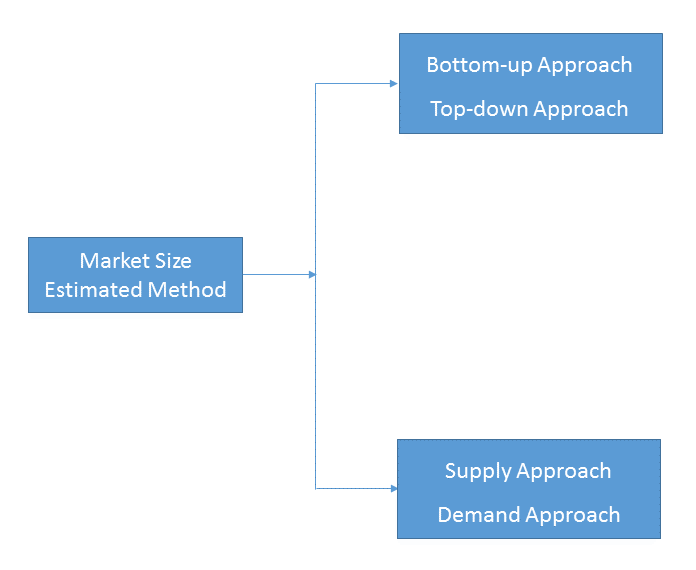
1)Top-down & Bottom-up Approach
Top-down approach uses a general market size figure and determines the percentage that the objective market represents.
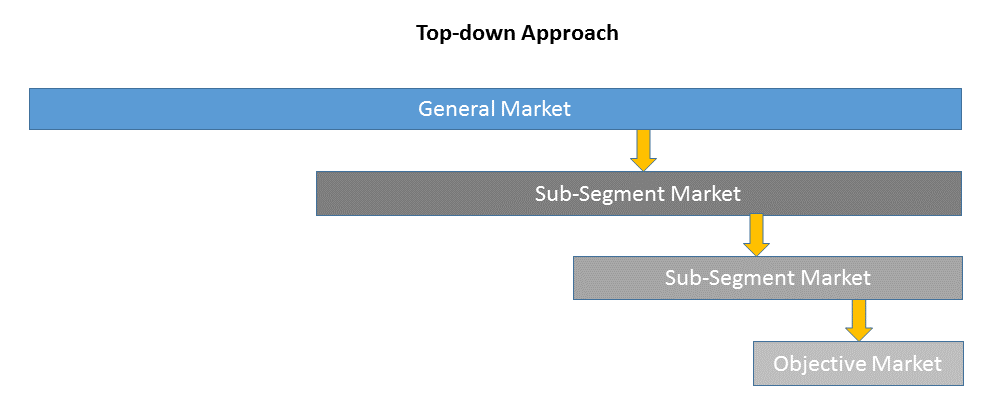
Bottom-up approach size the objective market by collecting the sub-segment information.

2)Supply & Demand Approach
Supply approach is based on assessments of the size of each competitor supplying the objective market.
Demand approach combine end-user data within a market to estimate the objective market size. It is sometimes referred to as bottom-up approach.
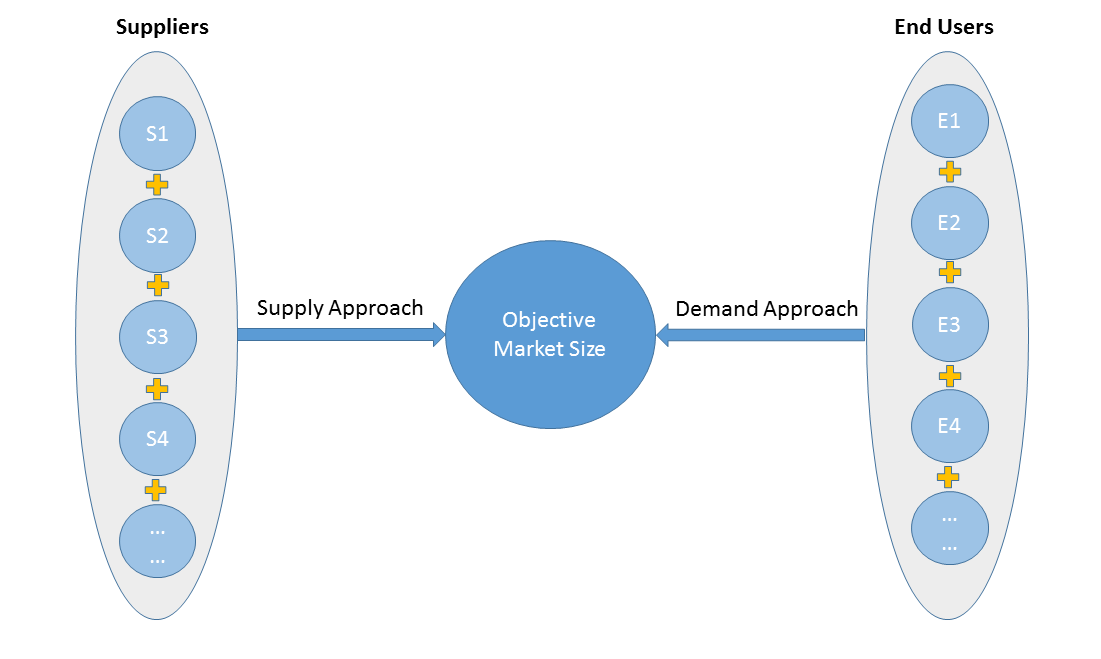
- Forecasting Methodology
- Numerous factors impacting the market trend are considered for forecast model:
- New technology and application in the future;
- New project planned/under contraction;
- Global and regional underlying economic growth;
- Threatens of substitute products;
- Industry expert opinion;
- Policy and Society implication.
- Analysis Tools
1)PEST Analysis
PEST Analysis is a simple and widely used tool that helps our client analyze the Political, Economic, Socio-Cultural, and Technological changes in their business environment.
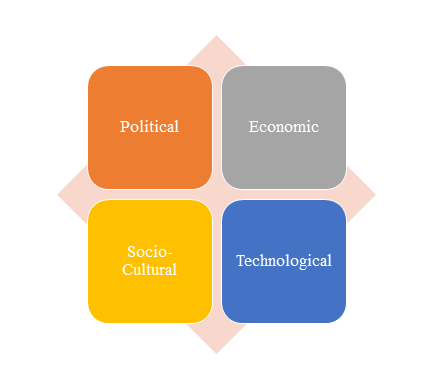
- Benefits of a PEST analysis:
- It helps you to spot business opportunities, and it gives you advanced warning of significant threats.
- It reveals the direction of change within your business environment. This helps you shape what you’re doing, so that you work with change, rather than against it.
- It helps you avoid starting projects that are likely to fail, for reasons beyond your control.
- It can help you break free of unconscious assumptions when you enter a new country, region, or market; because it helps you develop an objective view of this new environment.
2)Porter’s Five Force Model Analysis
The Porter’s Five Force Model is a tool that can be used to analyze the opportunities and overall competitive advantage. The five forces that can assist in determining the competitive intensity and potential attractiveness within a specific area.
- Threat of New Entrants: Profitable industries that yield high returns will attract new firms.
- Threat of Substitutes: A substitute product uses a different technology to try to solve the same economic need.
- Bargaining Power of Customers: the ability of customers to put the firm under pressure, which also affects the customer's sensitivity to price changes.
- Bargaining Power of Suppliers: Suppliers of raw materials, components, labor, and services (such as expertise) to the firm can be a source of power over the firm when there are few substitutes.
- Competitive Rivalry: For most industries the intensity of competitive rivalry is the major determinant of the competitiveness of the industry.
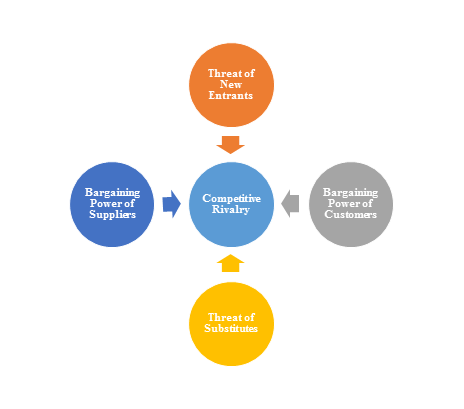
3)Value Chain Analysis
Value chain analysis is a tool to identify activities, within and around the firm and relating these activities to an assessment of competitive strength. Value chain can be analyzed by primary activities and supportive activities. Primary activities include: inbound logistics, operations, outbound logistics, marketing & sales, service. Support activities include: technology development, human resource management, management, finance, legal, planning.
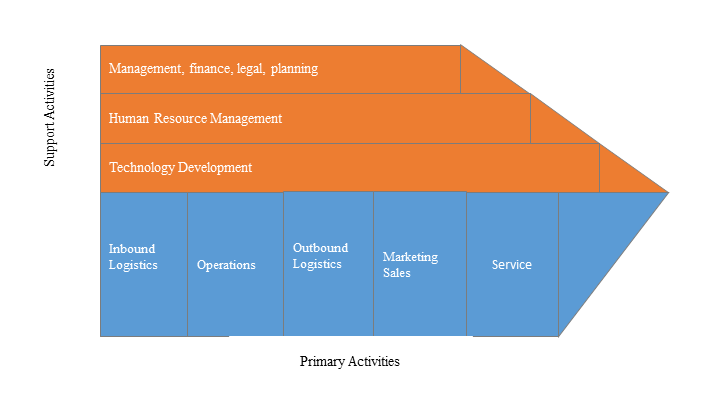
4)SWOT Analysis
SWOT analysis is a tool used to evaluate a company's competitive position by identifying its strengths, weaknesses, opportunities and threats. The strengths and weakness is the inner factor; the opportunities and threats are the external factor. By analyzing the inner and external factors, the analysis can provide the detail information of the position of a player and the characteristics of the industry.
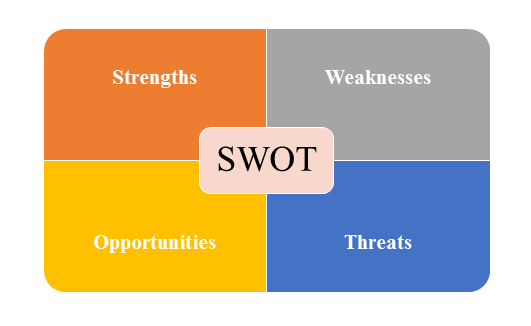
- Strengths describe what the player excels at and separates it from the competition
- Weaknesses stop the player from performing at its optimum level.
- Opportunities refer to favorable external factors that the player can use to give it a competitive advantage.
- Threats refer to factors that have the potential to harm the player.
- Data Sources
| Primary Sources | Secondary Sources |
|---|---|
| Face to face/Phone Interviews with market participants, such as: Manufactures; Distributors; End-users; Experts. Online Survey |
Government/International Organization Data: Annual Report/Presentation/Fact Book Internet Source Information Industry Association Data Free/Purchased Database Market Research Report Book/Journal/News |